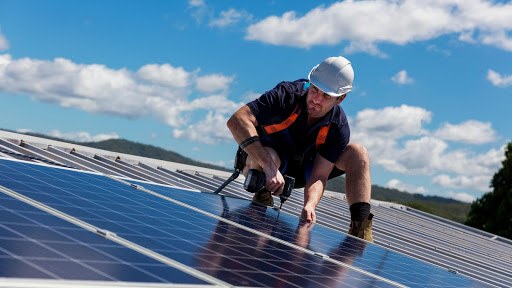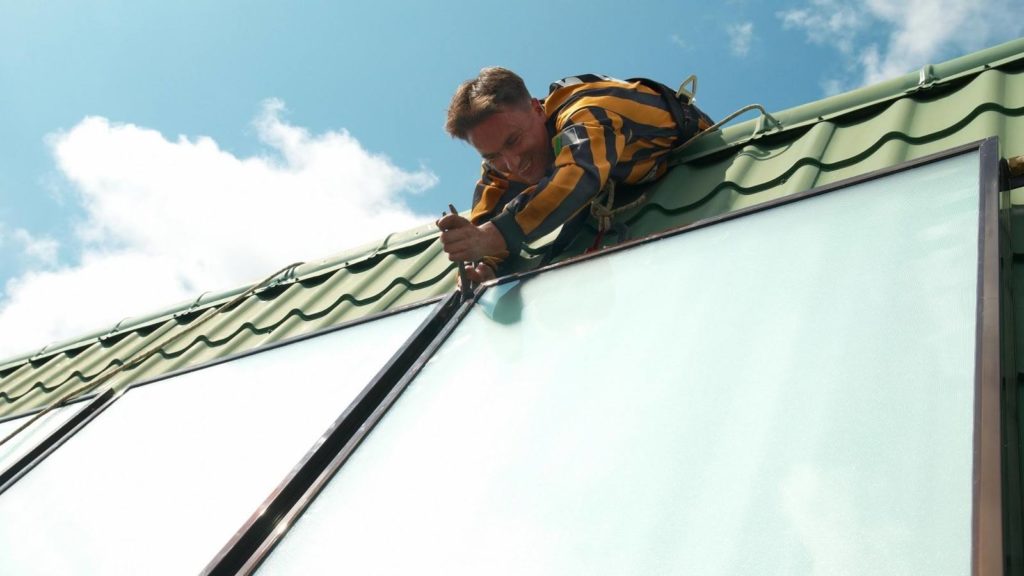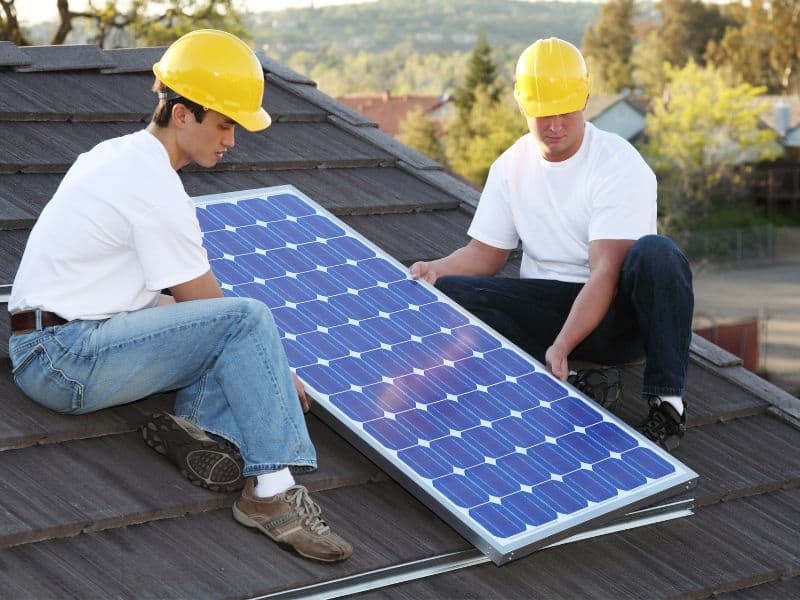If you look at all the rooftops of your neighborhood, chances are at least one of your neighbors has solar panels.
Decades ago, only people looking to get off the grid or living in remote areas used solar panels in their homes. Now, the residential use of solar panels has become more accessible than ever and is quickly becoming a great way to switch to clean energy in your home.
Solar panels capture and store energy from the sun and are often used to heat and cool the home. There are many benefits to using solar to heat and cool your home, but before the installation process begins, it helps to do a little research on what would be best for your home and what roofing and solar company would be best equipped to do the job.
Why You Should Switch to Solar
Let’s start with the basics: Why switch to solar?
A solar power system lasts up to 35 years, and in that time, you can save a lot of money on your electric bill. By installing your solar panel system, you are creating your grid of energy for your household to use–no more paying the electric and gas company.
Getting solar also allows you to take control of your energy usage. You can see how much energy is being stored and can distribute it the way you want, so there’s no more guessing what power source is making your electric bill so high.
For the eco-conscious consumer, solar reduces your carbon footprint and contributes to a sustainable lifestyle.
Things to Consider when Switching to Solar
So you want the benefits of solar, but what does that mean for your roof?
Though the cost of solar has drastically declined in the last decade, you should make sure to budget for the installation.
If your roof is older or close to the end of its lifetime, consider replacing it before installing solar panels. Old and damaged roofs are not ideal for solar panels, but roof replacement coupled with new solar panels will save you money in the long run, even if it is a substantial upfront expense.
What Roofs work best with Solar Panels?
Solar panels can work with almost every kind of roof, but each type of roof presents different challenges. Here is what you should consider for the solar panel installation process with these types of roofs:
Asphalt Shingle Roofs
Asphalt shingle roofs are one of the most common roofs and are very compatible with solar panel systems. These roofs last up to 25 years and should last throughout the lifetime of the solar panel system.
These roofs typically take up to three days to install depending on the complexity of the roof and the size of the house.
Metal Roofing
Another roof style very compatible with solar panel systems is metal roofs.
Metal roofs often last longer than shingle roofs with an average lifespan of 60 years. They are also extremely durable–some metal roofs have lasted over 100 years. This makes it a great candidate for solar panel installation because the roof will most likely outlive the solar panels.
Metal roofs also naturally repel heat and cold, making them especially compatible with a solar panel system for extra sustainability.
Flat Roofs
Like many other roofs, flat roofs can also pair nicely with solar panels, as long as the system is installed correctly.
Having a flat roof opens you up to more installation possibilities than a sloped roof. A solar panel and roofing professional should be able to point the panels in any direction that will catch the most sun throughout the day. There are also systems available that tilt and follow the sun for maximum energy capture and efficiency. Those systems are more typically seen on commercial buildings though.
Flat roofs generally have a lifespan of up to 30 years and are the choice of many retail and office spaces.
How a Roofing Company will Help
Though installing solar panels seems straightforward, the process is very complex and can best be handled by a professional. You should choose a professional roofing company that also specializes in solar installs or a dedicated solar installer to ensure the wiring is installed correctly and the process is executed safely.
When hiring a professional, there’s no second-guessing if your grid is up to code and working to its full potential. Your local power utility will also have to sign off on the installation for safety reasons if you plan to keep your home tied to the power grid while also using solar. An improperly configured ‘grid-tie’ system could cause injuries to line crews in the event of a power outage. These systems must be wired correctly so that they do not backfeed into the local grid when the power’s out.
A good roofing and solar professional should be able to know all the best practices when it comes to solar installation. He or she should be able to inspect the roof and spot any red flags during the process and be able to quickly solve any issues that pop up.
Keeping Your System Running Efficiently
Solar energy systems are a popular choice for homeowners and businesses looking to reduce their carbon footprint and lower their energy costs. However, like any other type of home or commercial equipment, solar energy systems require maintenance and repairs to keep them running efficiently. Here, we’ll take a closer look at the maintenance and repair needs of solar energy systems.
Importance of Regular Maintenance
Regular maintenance is crucial for ensuring that your solar energy system continues functioning at its best. This includes cleaning the panels to remove dirt, debris, and buildup, checking the wiring and connections for signs of damage, and ensuring that the panels are correctly aligned. Regular maintenance can also help to identify potential problems early on, allowing for repairs to be made before they turn into more significant and costly issues.
Common Repair Needs
Solar energy systems are designed to be durable and long-lasting, but over time, they may need repairs. Some of the most common repair needs include fixing damaged panels, replacing worn-out inverters, and fixing leaks in the roof or panels. In some cases, the system may also need to be re-aligned if it has become misaligned over time.
Choosing a Professional Repairer
When it comes to repairing your solar energy system, it’s important to choose a professional repairer with experience and expertise in this area. A qualified and experienced repairer will be able to diagnose the problem quickly and accurately, making the necessary repairs in a timely and cost-effective manner.
The Cost of Repairs
The cost of repairs will vary depending on the type of issue and the size of your solar energy system. In many cases, repairs can be made relatively inexpensively, especially if caught early. However, if the problem is more complex, the cost may be higher. It’s essential to consider the cost of repairs when deciding whether to invest in a solar energy system.
Maintenance and repairs are an important part of owning a solar energy system. Regular maintenance can help to keep your system running efficiently and identify potential problems early while choosing a professional repairer can ensure that your repairs are made quickly and cost-effectively. By understanding the importance of maintenance and repairs, you can make the most of your investment in solar energy.
What is the best roof direction for solar panels?
South-facing rooftops generally provide maximum efficiency potential given most long-term weather patterns seen within the United States – but other factors such as regional climate variation, local laws/regulations, and technological solutions should also be kept in mind when selecting an optimal direction for your own rooftop solar panel system installation project. With proper research and planning ahead of time, you can ensure you make an informed decision that will help optimize your energy production goals while also meeting all budgetary constraints associated with investment into such renewable energy sources.











